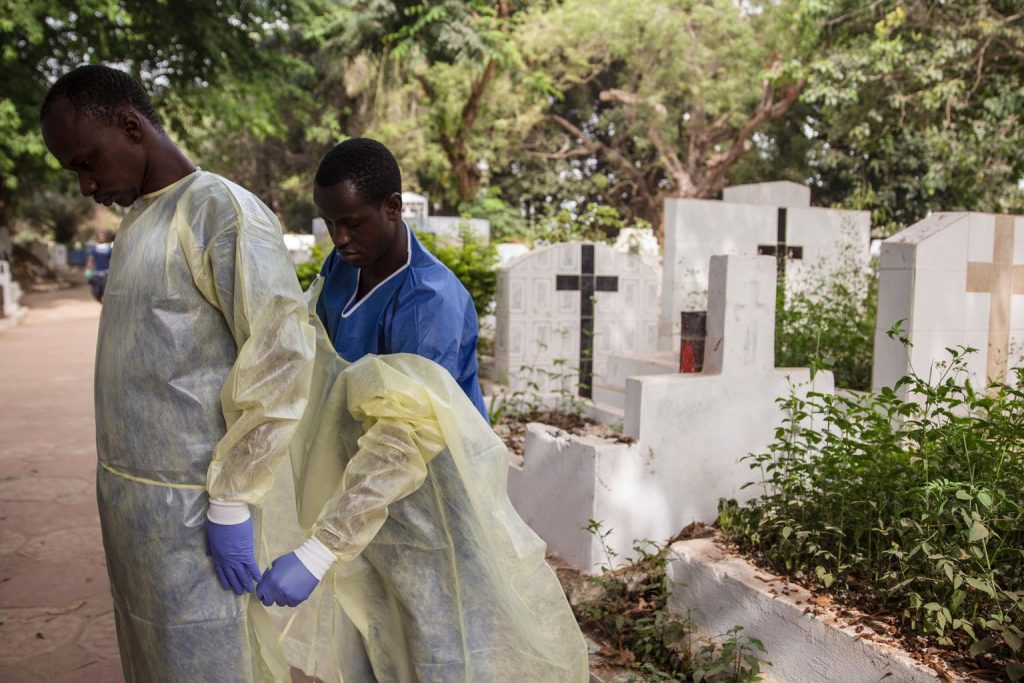This Practical Approaches brief highlights key considerations for rapidly appraising burial/funerary practices and beliefs around death/dying during an epidemic. It provides guidance on the relevant social science knowledge required to adapt epidemic preparedness and response to the local context. By using this tool, an overview of local knowledge, meaning and practice will be gained, which can help inform programming related to death and burial.
Topics
Health
UNICEF/UNI177688/UNMEER Martine Perret
On 17 January, a worker from the International Federation of Red Cross and Red Crescent Societies (IFRC) helps a fellow worker doff his personal protective equipment in Conakry, the capital. They are part of a team helping transport the body of a woman who died from EVD from Donka Hospital to a nearby cemetery. The workers are responsible for safe and dignified burials, which respect cultural and religious customs while still ensuring persons do not come in contact with highly contagious corpses. Also critical to curtailing the outbreak is raising awareness of how the disease is spread and of the importance of safe burials, as well as working to ensure that families inform health facilities when someone is sick or has died. UNICEF continues to support social mobilization initiatives that promote understanding of these best practices among households across the country.
By 14 January 2015, Guinea remained one of three countries suffering widespread and intense transmission of Ebola virus disease (EVD). To date, there had been 2,806 cumulative cases (confirmed, probable and suspected), resulting in 1,814 deaths, in the country. As of 13 January, over 4.1 million children were living in areas affected by the virus, while 564 children and youth aged up to 20 years have themselves become infected. Despite these obstacles, in the week leading up to 14 January, the country reported its lowest weekly total of new confirmed EVD cases since the week ending 17 August 2014. UNICEF, together with partners, continues to provide vital support across multiple sectors, including communication for development (C4D), including efforts to raise awareness of the disease and effect behavioural changes that help halt its spread; health and nutrition; water, sanitation and hygiene; child protection; and education.
Related content
Infographics
Key Considerations: Child Engagement in the Context of Disease Outbreaks in Eastern and Southern Africa
This infographic summarises the insights from a recent key considerations brief on child engagement in the context of disease outbreaks in Eastern and Southern Africa. This brief explores why, when and how to engage children in the prevention, response and…
Central and East Africa Hub
SSHAP
2024
Infographics
Key Considerations for Responding to Floods in South Sudan Through the Humanitarian-Peace-Development Nexus
This infographic summarises the insights from a recent key considerations brief on responding to floods in South Sudan through the lens of Humanitarian-Peace-Development (HDP) Nexus. The brief describes the multidimensional impacts of flooding on peace, health, livelihoods and governance and…
Central and East Africa Hub
SSHAP
2024
Briefing
Key Considerations: Child Engagement in the Context of Disease Outbreaks in Eastern and Southern Africa
Effective child engagement strategies are essential to optimise the response to disease outbreaks and minimise their impact while ensuring children’s protection, well-being and resilience. When children understand disease outbreaks, they are better able to cope, contribute and recover. This promotes…
Central and East Africa Hub
SSHAP
2024
Briefing
Key Considerations for Responding to Floods in South Sudan Through the Humanitarian-Peace-Development Nexus
In common with many other African countries, the Republic of South Sudan is increasingly experiencing devastating floods linked to climate change.1,2 The Indian Ocean Dipole (IOD) and El Niño regulate the climate of Equatorial Eastern Africa. In 2019, a dipole…
Central and East Africa Hub
SSHAP
2024


